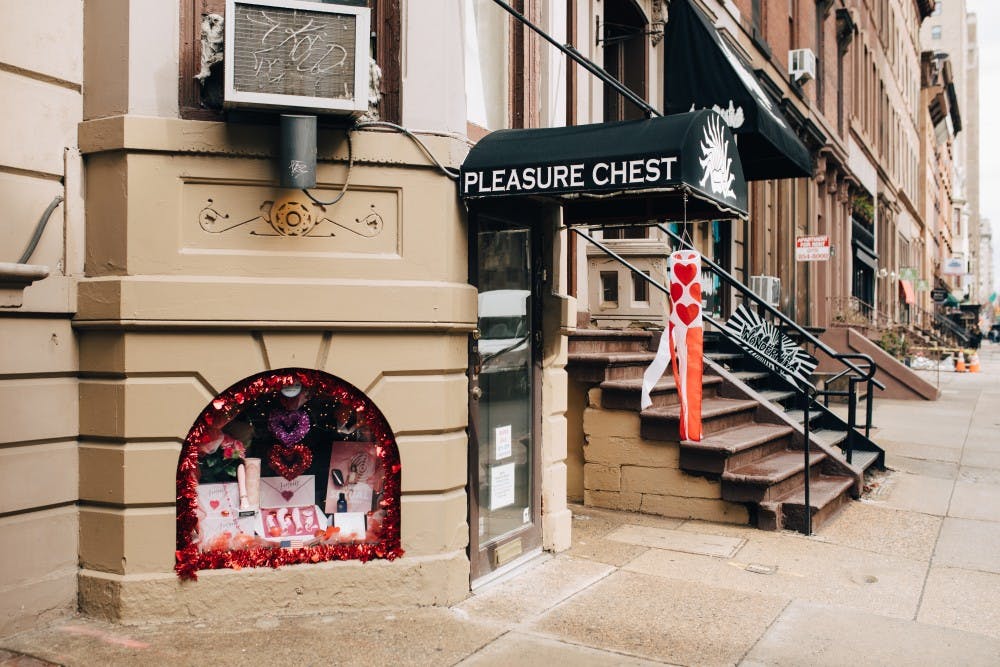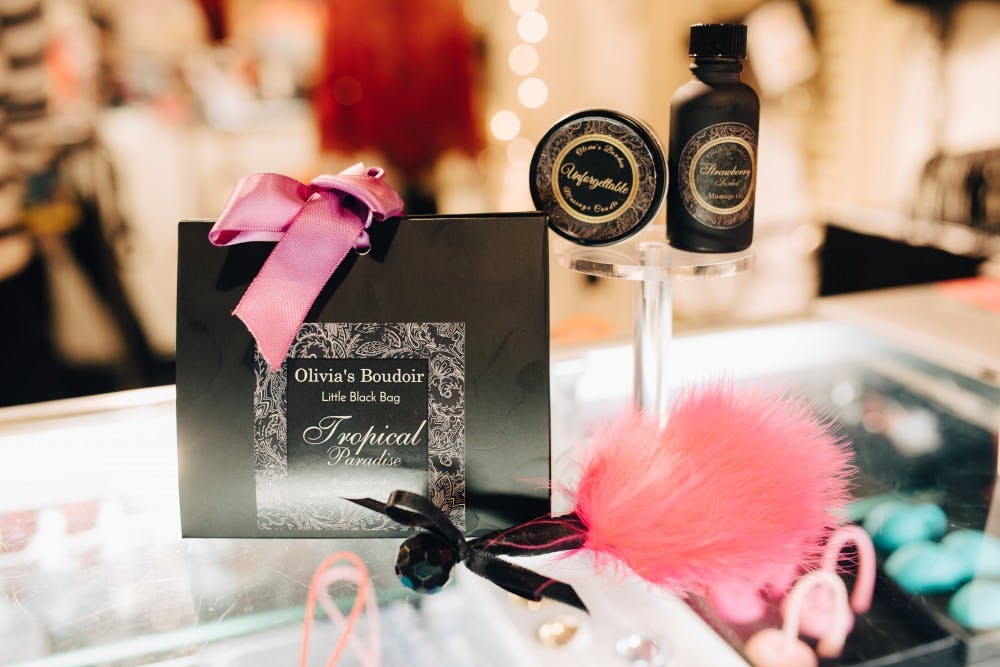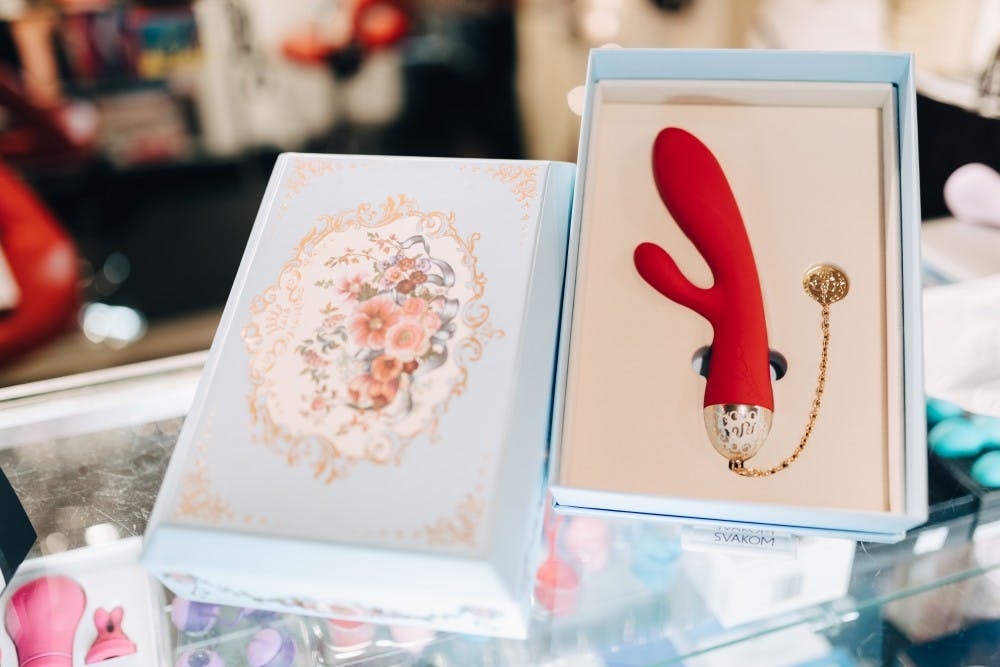The outside of Pleasure Chest strikes fear into the hearts of many passersby. Squeamishness, yes, but also pure terror. Why? Because walking through the doors of this obscure, underground Philly sex toy shop is like stumbling into another world—a vast assortment of erotic toys, sexy costumes of all colors and themes, condoms galore, and lip–shaped red leather seats—most of which intimidate people.
I trespassed into this oblivion on a foggy Tuesday two weeks ago. Thoughts scattered through my mind as I pushed open the door: What if someone from Penn sees me go in here? Are people going to think I’m some crazy sex fanatic? The fear of others purely knowing I was in a sex shop and the resulting judgment that would occur nearly deterred me from entering. When I shared my initial fear with Susan Mannino, the owner of Pleasure Chest, she was surprised.

Mannino got involved with Pleasure Chest after going on a date with the then–owner of the store, who later became her husband. “This is the last thing you’d think in the world that I was going to be doing,” Mannino explains. She studied nutrition at Drexel in the '80s. Her husband passed away years later.
For the 45 years that Pleasure Chest has been in business, Mannino hasn’t been exposed to the type of fear or discomfort around self—pleasure that is seemingly prevalent among teens and young adults.
It’s common to hear about guys “jerking off,” but “weird” or even "gross" to hear that a girl masturbates. Conversely, if a guy doesn’t jerk off, that’d be weird. While this strong stigma does dissolve a bit in college, some of the underlying social tones remain. Either way, orgasming is a bodily function, yet people are still freaked out about it. So why is self–pleasure normalized for men in American culture and not for women?
Perhaps the answer lies in education. Girls are not typically taught when they are young that masturbating is normal. Some are shocked that girls even masturbate, and can feel guilty, disgusted with their own actions, judged, or even scared. Others are entirely comfortable with the idea. The spectrum is vast in comparison to boys who almost always view their own masturbation as a norm.
Mannino shares her perspective: “I don’t really understand either extreme, you don’t really need to be out there telling everybody you’re [masturbating]," she says—adding that you also shouldn’t purposefully avoid it—“but you should certainly know where you can go and get what you need if you want to. There’s no reason you can’t have the best orgasms in the world.”

Perhaps people are uncomfortable with the idea of toys for the purpose of orgasms because, for some, orgasms largely rest in the realm of the unknown. Mannino says, “If I had known about this place if I was in college, I would have better grades.” She believes that regular masturbation for students can lead to performing better in school.
When I explain to her that some young women have become complacent with having sex without having an orgasm—or in some cases, faking them—she exclaims, “What the hell is going on?”
To Mannino, when one person finishes, sex shouldn’t be “over.” It’s not one–sided, yet sometimes sex is treated that way. In these scenarios, one partner is treated as a vessel—a means to an end. Mannino says that women can’t just sit around waiting for an orgasm. That would be too easy! “It doesn’t just happen, it’s not like digestion,” she says.
Although her remark is humorous, Mannino has a critical point. When women haven’t had an orgasm because they fear masturbation, “they don’t know what they’re fighting for,” Mannino explains.
On the other side of the spectrum, some partners feel threatened. Men always ask Mannino, “Are you putting us out of business?” Her response: “If you’re a lousy crap, yeah.”
And the business of orgasms isn’t exclusive to young people. “People always asks who shops here, and the spectrum is everybody. It’s from 20 to 80. If they can walk down those steps... I mean we’ve wheeled people down those steps,” Mannino adds. She loves the idea of a safe environment where any type of person, regardless of age, gender, race, socioeconomic class, body size, or sexuality can positively receive sex education.
It is frustrating, Mannino admits, when people come into the store for the wrong purposes. She explains, “When people are with their friends they can be ridiculous—it’s more of an entertainment thing.” Obviously visiting a sex toy shop is fun, but people throwing dildos and vibrators around quickly becomes disrespectful.

Surprisingly enough, men used to dominate sex toy shops back when Pleasure Chest was first opened in the mid–70s. Running Pleasure Chest now is empowering for Mannino. She loves her job.
While everyone has different sexual preferences, the goal of Pleasure Chest is for people to get what they want and deserve in sexual interactions. The point is that if you want to have an orgasm, you have the power to advocate for yourself.
People like Susan Mannino remind us that prioritizing your own pleasure regardless of the status of your sex life is vital. If your partner is finishing, you should be too. Like Mannino says, “You’re in charge of your sex life. It’s up to you to decide what is acceptable and what is not.”

